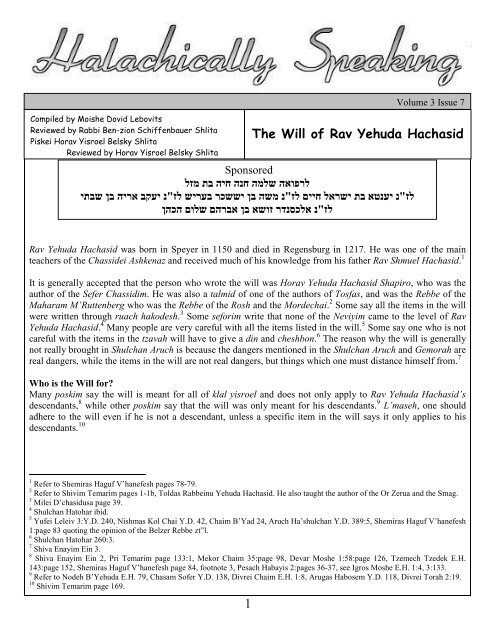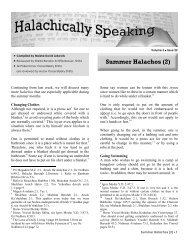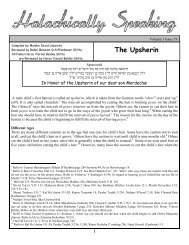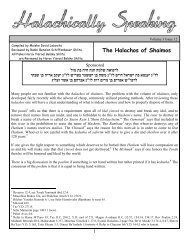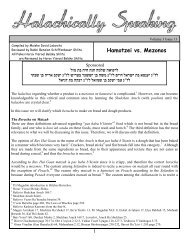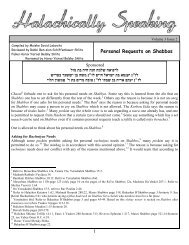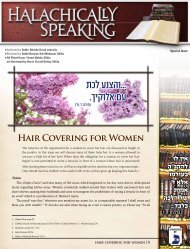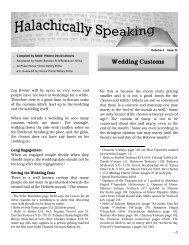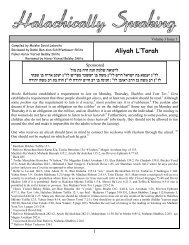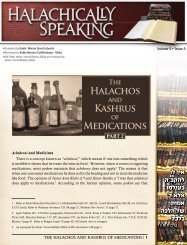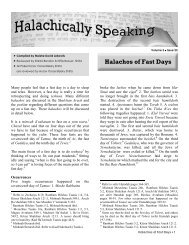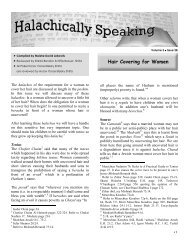1 The Will of Rav Yehuda Hachasid - Halachically Speaking
1 The Will of Rav Yehuda Hachasid - Halachically Speaking
1 The Will of Rav Yehuda Hachasid - Halachically Speaking
Create successful ePaper yourself
Turn your PDF publications into a flip-book with our unique Google optimized e-Paper software.
Compiled by Moishe Dovid Lebovits<br />
Reviewed by Rabbi Ben-zion Schiffenbauer Shlita<br />
Piskei Horav Yisroel Belsky Shlita<br />
Reviewed by Horav Yisroel Belsky Shlita<br />
יתבש ן ב<br />
<strong>Halachically</strong> <strong>Speaking</strong><br />
<strong>Rav</strong> <strong>Yehuda</strong> <strong>Hachasid</strong> was born in Speyer in 1150 and died in Regensburg in 1217. He was one <strong>of</strong> the main<br />
teachers <strong>of</strong> the Chassidei Ashkenaz and received much <strong>of</strong> his knowledge from his father <strong>Rav</strong> Shmuel <strong>Hachasid</strong>. 1<br />
It is generally accepted that the person who wrote the will was Horav <strong>Yehuda</strong> <strong>Hachasid</strong> Shapiro, who was the<br />
author <strong>of</strong> the Sefer Chassidim. He was also a talmid <strong>of</strong> one <strong>of</strong> the authors <strong>of</strong> Tosfas, and was the Rebbe <strong>of</strong> the<br />
Maharam M’Ruttenberg who was the Rebbe <strong>of</strong> the Rosh and the Mordechai. 2 Some say all the items in the will<br />
were written through ruach hakodesh. 3 Some seforim write that none <strong>of</strong> the Neviyim came to the level <strong>of</strong> <strong>Rav</strong><br />
<strong>Yehuda</strong> <strong>Hachasid</strong>. 4 Many people are very careful with all the items listed in the will. 5 Some say one who is not<br />
careful with the items in the tzavah will have to give a din and cheshbon. 6 <strong>The</strong> reason why the will is generally<br />
not really brought in Shulchan Aruch is because the dangers mentioned in the Shulchan Aruch and Gemorah are<br />
real dangers, while the items in the will are not real dangers, but things which one must distance himself from. 7<br />
Who is the <strong>Will</strong> for?<br />
Many poskim say the will is meant for all <strong>of</strong> klal yisroel and does not only apply to <strong>Rav</strong> <strong>Yehuda</strong> <strong>Hachasid</strong>’s<br />
descendants, 8 while other poskim say that the will was only meant for his descendants. 9 L’maseh, one should<br />
adhere to the will even if he is not a descendant, unless a specific item in the will says it only applies to his<br />
descendants. 10<br />
1<br />
Refer to Shemiras Haguf V’hanefesh pages 78-79.<br />
2<br />
Refer to Shivim Temarim pages 1-1b, Toldas Rabbeinu <strong>Yehuda</strong> <strong>Hachasid</strong>. He also taught the author <strong>of</strong> the Or Zerua and the Smag.<br />
3<br />
Milei D’chasidusa page 39.<br />
4<br />
Shulchan Hatohar ibid.<br />
5<br />
Yufei Leleiv 3:Y.D. 240, Nishmas Kol Chai Y.D. 42, Chaim B’Yad 24, Aruch Ha’shulchan Y.D. 389:5, Shemiras Haguf V’hanefesh<br />
1:page 83 quoting the opinion <strong>of</strong> the Belzer Rebbe zt”l.<br />
6 Shulchan Hatohar 260:3.<br />
7 Shiva Enayim Ein 3.<br />
8 Shiva Enayim Ein 2, Pri Temarim page 133:1, Mekor Chaim 35:page 98, Devar Moshe 1:58:page 126, Tzemech Tzedek E.H.<br />
143:page 152, Shemiras Haguf V’hanefesh page 84, footnote 3, Pesach Habayis 2:pages 36-37, see Igros Moshe E.H. 1:4, 3:133.<br />
9 Refer to Nodeh B’<strong>Yehuda</strong> E.H. 79, Chasam S<strong>of</strong>er Y.D. 138, Divrei Chaim E.H. 1:8, Arugas Habosem Y.D. 118, Divrei Torah 2:19.<br />
10 Shivim Temarim page 169.<br />
1<br />
Volume 3 Issue 7<br />
<strong>The</strong> <strong>Will</strong> <strong>of</strong> <strong>Rav</strong> <strong>Yehuda</strong> <strong>Hachasid</strong><br />
Sponsored<br />
לזמ תב היח הנח המלש האופרל<br />
הירא בקעי נ"<br />
זל<br />
שירעב רכששי ןב השמ נ"<br />
זל<br />
םייח לארשי תב אטנעי נ"<br />
זל<br />
ןהכה םולש םהרבא ןב אשוז רדנסכלא נ<br />
" זל
<strong>Halachically</strong> <strong>Speaking</strong><br />
Mitzvah<br />
If one is doing an action for a mitzvah and the will <strong>of</strong> <strong>Rav</strong> <strong>Yehuda</strong> <strong>Hachasid</strong> says not to do it because <strong>of</strong> danger<br />
then one should not do the action. In this situation we do not say that the merit <strong>of</strong> the mitzvah will protect one<br />
from harm. 11<br />
Closing Up Windows and Doors<br />
<strong>Rav</strong> <strong>Yehuda</strong> <strong>Hachasid</strong> maintains that one should not completely close up the opening <strong>of</strong> a window (or door) so<br />
that the sheidim should be able to go out. One is permitted to close up a window if he makes a little hole in the<br />
wall covering the opening. 12 <strong>The</strong> inyun is only if one is completely closing the opening with building material,<br />
and one is permitted to fill the hole with s<strong>of</strong>t and non-permanent material. 13 This inyun also applies to a shul. 14<br />
Once a hole is made in the covering it can be covered on both sides. 15 Alternatively, one may place a piece <strong>of</strong><br />
furniture in front <strong>of</strong> the hole to cover it. 16<br />
Some say the inyun only applies if one removed the molding and side posts <strong>of</strong> the window (or door), and if<br />
these items were not removed then closing up the window is permitted. 17<br />
Based on this inyun, some are <strong>of</strong> the opinion one should not change the location <strong>of</strong> the windows in his house. 18<br />
One who buys a house from a goy does not have to go around the house checking for windows which were<br />
closed up. 19<br />
A window which is never opened may be closed up and there is no concern <strong>of</strong> danger. 20<br />
It is permitted to close up a window if one will open another window within four amos <strong>of</strong> the original window’s<br />
location. 21 Others are not sure if this helps. 22 If there are two windows next to each other, one may close up one<br />
<strong>of</strong> them, since the sheidim will be able to exit from the second window. 23<br />
One who has an open porch with windows is permitted to covert it into an indoor porch. 24<br />
11<br />
Shiva Enayim Ein 5, see Maharam Brisk 1:29, Kaf Ha’chaim Y.D. 116:121, Yechaveh Da’as 5:46, Shemiras Haguf V’hanefesh<br />
pages 86-88.<br />
12<br />
Item on <strong>Will</strong> #20. Refer to Sefer Chassidim 1146, Ben Ish Chai Pinchus 2:17, Taamei Haminhagim Lekutim 74 (Kuntres Achron),<br />
Halichos Olom 7:page 221. Refer to Sefer Habayis 17:2:footnote 3 in depth if it is a danger for the one who closes the window or door<br />
or the one who lives in the house. <strong>The</strong> size <strong>of</strong> the hole can be very small (Halichos Chaim 2:page 115:231).<br />
13<br />
Horav Yisroel Belsky Shlita.<br />
14<br />
Mekor Chesed 30, Chaim B’Yad 25:page 32, Yosef Ometz 37:1.<br />
15<br />
Tzemach Tzedek on the will, Kaf Ha’chaim Y.D. 116:122, Kinyan Torah 7:65, Shevet Ha’Levi 6:111:12, Shevet Ha’kehusi<br />
4:325:2, Divrei Shalom 5:piskei halachos 161, see Toras Yeko’seal 15, Sefer Habayis 17:4.<br />
16<br />
V’ein Lumo Michshal 5:page 106:16.<br />
17<br />
Milei D’chasidusa 20, Shivim Temarim 23:pages 59-60.<br />
18<br />
Sefer Chassidim 461, see Sefer Habayis 17:6.<br />
19<br />
Chakal Yitzchok 46:page 154, Bais Avi 2:69, Sefer Habayis 17:3.<br />
20<br />
Horav Yisroel Belsky Shlita. One who wants to close up a window may not place small square windows (which do not open) in the<br />
windows place. This is very common today and people are unaware that is not permitted.<br />
21<br />
Horav Yisroel Belsky Shlita.<br />
22<br />
Refer to Sefer Habayis 17:footnote 1.<br />
23<br />
Horav Yisroel Belsky Shlita. Refer to Shivim Temarim page 59.<br />
24 Shevet Ha’kehusi 5:141.<br />
2
<strong>Halachically</strong> <strong>Speaking</strong><br />
Moving an Oven<br />
One is not allowed to remove an oven from its place since doing so is putting himself in danger. 25 <strong>The</strong> reason is<br />
because sheidim are underneath an oven and when one moves the oven one is starting up with the sheidim. 26<br />
This item in the will is brought down by many poskim and one should adhere to it. 27 Some say an oven may be<br />
moved if one did not cook on it for a while. 28 It would seem that one may move an oven to fix it. 29 This inyun<br />
does not apply to radiators which are built into the wall. 30 Some say if an oven was only used for cooking (and<br />
not baking) then one may be lenient. 31 Some suggest one who has to move an oven should sell it to a goy, and<br />
then buy it back from him after it is moved. 32 <strong>The</strong>re is an opinion in the poskim that says the whole concern <strong>of</strong><br />
moving an oven applies if one will sleep in the empty space where the oven used to be. 33<br />
Many poskim say one may not even move an oven to use the space for a Yeshiva. 34<br />
One may remove an oven if he will put a different oven in its place. 35 Based on this one who is remolding a<br />
kitchen may remove the oven to replace it with another one. However, it would be forbidden to change the<br />
place <strong>of</strong> the oven in the kitchen. 36 If the entire inside <strong>of</strong> the house is demolished, it would seem that moving the<br />
oven to a different spot is permitted. 37<br />
Some poskim say one may move an oven if he removes an amah <strong>of</strong> ground from underneath it. 38 Others are<br />
lenient and say one is only required to remove a tefach <strong>of</strong> ground from underneath the oven. 39<br />
<strong>The</strong>re are poskim who say the danger is only for the one who actually removes the oven, and there is no danger<br />
to the renter or owner <strong>of</strong> the house, 40 while others disagree with this. 41 In any case, since this involves danger,<br />
one who is not unsure if a particular case is included in this part <strong>of</strong> the will should consult a competent <strong>Rav</strong>.<br />
Marrying Someone with the Same name as One’s Parent<br />
One <strong>of</strong> the most famous items in <strong>Rav</strong> <strong>Yehuda</strong> <strong>Hachasid</strong>’s will is the inyun for a girl not to marry a boy who has<br />
the same name as her father, and a boy not to marry a girl who has the same name as his mother. 42 This item in<br />
25<br />
Item On <strong>Will</strong> # 49.<br />
26<br />
Refer to Sefer Habayis 18:footnote 2. Furthermore, a oven that bakes is like a tree that makes fruits, and just as one cannot chop<br />
down a fruit tree he cannot get rid <strong>of</strong> an oven (Mekor Chesed 66). Some say it may not apply to a goy’s oven (Sefer Habayis<br />
18:4:footnote 2).<br />
27<br />
Yosef Ometz 37:1, Ben Ish Chai Pinchus 2:17, Nishmas Kol Chai Y.D. 42:page 43, Kaf Ha’chaim Y.D. 116:120, Halichos Olom<br />
7:page 221.<br />
28<br />
Mekor Chesed 66, Zichron <strong>Yehuda</strong> 2:159, Milei D’chasidusa 49.<br />
29<br />
Milei D’chasidusa 49, Yad Yitzchok 3:109, Tlumas Lev Y.D. 1:19.<br />
30<br />
Bais Shearim 193, Milei D’chasidusa 49, Tzemach Tzedek on this will.<br />
31<br />
Milei D’chasidusa 49, Divrei Yoel 1:52.<br />
32 Bais Shearim 193.<br />
33 Darchei Teshuva 116:45, Darchei Chaim V’sholom 866:page 319.<br />
34 Ben Pores 2:11, Maharam Brisk 1:29, Shivim Temarim 58, see Maharsham on the will, Bais Dovid Y.D. 56.<br />
35 Refer to Milei D’chasidusa 58, Sefer Habayis 18:footnote 18.<br />
36 Shemiras Haguf V’hanefesh page 220.<br />
37 Maharsham 2:90, Shemiras Haguf V’hanefesh 18:footnote 19 in depth.<br />
38 Divrei Yoel 1:52, Divrei Shalom 5:135.<br />
39 Bais Shearim 193, Atzei Chaim Y.D. 13, Zichron <strong>Yehuda</strong> 2:159.<br />
40 Refer to Ohel Moshe page 73, Sefer Habayis 18:footnotes 11-12.<br />
41 Bais Shearim 193, Darchei Teshuva 116:45, Tlumas Lev Y.D. 1:19.<br />
42 Item on will #22, see Sefer Chassidim 477, Lekutei Maharich 3:page 741 (new). Some say if one does not listen to this will the<br />
marriage will not be successful (Yosef Ometz 37:3:page 55b, Chazzon Yeshaya page 94). A chosson may have the same name as his<br />
mother-in-law and a kallah the same name as her father-in-law. For example, if both the chosson and his mother-in-law are Simcha<br />
(Darchei Teshuva Y.D. 116:56, Shemiras Haguf V’hanefesh 171:2:footnote 2).<br />
3
<strong>Halachically</strong> <strong>Speaking</strong><br />
the will is discussed at length by many poskim. 43 Many say the inyun not to marry a girl with the same name as<br />
one’s mother is more stringent than the inyun <strong>of</strong> a girl not marrying a boy with the same name as her father. 44<br />
<strong>The</strong> Reasons<br />
One <strong>of</strong> the reasons for not marrying someone with the same name as one’s parent is because <strong>of</strong> kibud av v’eim.<br />
One whose spouse has the same name as a parent will not be able to call the spouse by first name in front <strong>of</strong> the<br />
parent since it would appear that the parent is being called by their first name. 45 Furthermore, one would not be<br />
able to name a child after one’s parents, since their spouse has the same name. 46 (Based on this reason, Sefardim<br />
can be lenient because they have the custom to name their children after living people). 47 One should not marry<br />
someone with the same name as a parent even if they agree not to use the name when calling each other. 48 Other<br />
poskim say the reason is because <strong>of</strong> ayin hara, 49 or other danger. 50<br />
<strong>The</strong> Opinions<br />
<strong>The</strong>re are a number <strong>of</strong> poskim who say this item in the will is only for <strong>Rav</strong> <strong>Yehuda</strong> <strong>Hachasid</strong>’s descendants, and<br />
no one else has to be concerned with this. 51 However, most poskim say one should adhere to this item in the<br />
will, 52 and this is the minhag ha’olom. One who wants to go against this item in the will should speak with a<br />
talmid chachum. 53<br />
Changing Names<br />
If one <strong>of</strong> the names are changed then the shidduch may continue. 54 It would seem there is no difference if the<br />
parent or child changes their name. 55 Some say the name only needs to be changed a little. For example, if both<br />
the mother and kallah are named Rivka, it would be enough for one <strong>of</strong> them to be called Rivkala. 56 According to<br />
some poskim if the Chosson is called “<strong>Rav</strong>” Yosef or the mother-in-law is called “Rabbonit” without being<br />
called by her first name, the inyun does not apply. 57<br />
Some say one who realizes the name <strong>of</strong> the boy she is going to get engaged to is the same as her father’s (or<br />
vice versa) should change a name to avoid the inyun before getting engaged. 58<br />
43 Refer to Ben Ish Chai Sh<strong>of</strong>tim 1:28, Yufel Leleiv E.H. 4:62:11, Milei D’chasidusa 23, Mishnas Elazar 2:29, Divrei Yisroel E.H.<br />
2:12, Zekan Aaron 2:60, Otzer Haposkim 2:47:11, Nesuin K’hilchosom 2:63. Some say this din applies to a stepfather as well<br />
(Zichron <strong>Yehuda</strong> 2:156, Nesuin K’hilchosom 2:92).<br />
44 Tzemech Tzedek E.H. 143, Minchas Yitzchok 7:109, Otzer Haposkim 2:47:2, Taamei Haminhagim 939:footnote 3:page 401,<br />
Chazzon Yeshaya page 99.<br />
45 Even Harosha 31, Shem M’Shimon E.H. 6, Mekor Chesed 33, Zichron <strong>Yehuda</strong> 2:146, Sdei Chemed chosson v’kallah 7:page 20,<br />
Minchas Elazar 3:13, Otzer Kibbud Av V’eim 97:page 156.<br />
46 Torah Temimah Vayishlach 32:4:page 148, Yismach Lev 1:page 7.<br />
47 Otzer Haposkim 2:47:4, see Yabea Omer E.H. 2:7:7, Ve’alu Lo Yeibol 1:page 128:17.<br />
48 Minchas Elazar 3:13.<br />
49 Pri Hasadeh 1:69:page 31, Otzer Kibbud Av V’eim 97:page 156, Chazzon Yeshaya pages 94-95.<br />
50 Shivim Temarim 26-27, Nesuin K’hilchosom 2:763.<br />
51 Refer to Nodeh B’<strong>Yehuda</strong> E.H. 79, Zichron <strong>Yehuda</strong> 2:149, Igros Moshe E.H. 1:4, Teshuvos V’hanhugos 1:731, Keroei Shmo page<br />
246, see ibid:page 239 quoting the opinion <strong>of</strong> Horav Chaim Kanievesky Shlita.<br />
52 Refer to Igros Moshe ibid, Divrei Yoel 2:115, Teshuvos V’hanhugos 1:731, see Yabea Omer E.H. 2:7 in depth, Nesuin<br />
K’hilchosom 2:65, Moreh Horim V’kebudam 6:26.<br />
53 Opinion <strong>of</strong> Horav Fisher zt”l quoted in Keroei Shmo page 237. Refer to Teshuvos V’hanhugos 1:731:3.<br />
54 Item on will #23, see Chazzon Yeshaya pages 102-103.<br />
55 Mekor Chesed 35.<br />
56 Sdei Chemed chosson v’kallah 9:pages 25-26, Zichron <strong>Yehuda</strong> 2:149. Others are stringent (Chazzon Yeshaya page 100).<br />
57 Refer to Maharsham 5:28, Sheilas Shalom 2:243, Zichron <strong>Yehuda</strong> 2:146, Tirosh V’yitzar 214:page 382.<br />
58 Refer to Mekor Chesed 33, Maharam Brisk 1:129, Levushei Mordechai E.H. 44, Kinyan Torah 2:126, see Minchas Elazar 7:109,<br />
Otzer Haposkim 2:47:13.<br />
4
<strong>Halachically</strong> <strong>Speaking</strong><br />
Three Identical Names<br />
Some say the inyun only applies if Reuvain has a son-in-law whose name is Reuvain and his son-in-law’s<br />
daughter wants to marry a person whose name is Reuvain. 59 One should not rely on this heter as most poskim<br />
disagree with it. 60<br />
Multiple Names<br />
A chosson who has two first names may marry a girl whose father matches one <strong>of</strong> them. For example, a chosson<br />
named Reuvain Yaakov could marry a girl whose father’s name is only Reuvain or only Yaakov. 61 <strong>The</strong> same<br />
applies where the chosson’s name matches one <strong>of</strong> the father-in-laws two names. <strong>The</strong> same concept would also<br />
apply to a kallah and her mother-in-law. 62 Although some poskim hold the person does not have to be called by<br />
both names, 63 the custom is that the person has to be called by both names. 64<br />
Nicknames<br />
<strong>The</strong> Chazzon Ish says the inyun only applies to the name one is actually called by, and not the name given at the<br />
bris etc. 65 <strong>The</strong>refore the inyun may not apply to a chosson who has the same name as his prospective father-inlaw<br />
but is called by a nickname. For example, two people can have the name Moshe, if one is called Moses or<br />
Mark. 66<br />
Name Added because <strong>of</strong> Sickness<br />
<strong>The</strong>re is no concern with this if one has the same name as his father-in-law because a second name was added<br />
(Rafuel, Chaim etc.) when he was sick. 67<br />
A Forgotten Name<br />
One whose name was forgotten to the extent that no one calls him by that name may get married to a person<br />
whose father is called by the forgotten name that he has. 68<br />
Leniencies<br />
Although there are some poskim who are lenient with this item on the will if the chosson is a talmid chachum, 69<br />
the minhag is to be stringent. 70<br />
59<br />
Chuchmas Adom 123:13, Pischei Teshuva Y.D. 116:6, Avnei Tzedek O.C. 28, Kitzur Shulchan Aruch 145:8Sdei Chemed choson<br />
v’kallah 5:pages 19-20, Kaf Ha’chaim Y.D. 116:125.<br />
60<br />
Shivim Temarim 26-27, Mekor Chesed 33, Bais Shearim 194, Devar Moshe 1:58, Maharsahm 1:136, 5:28, 6:145, 170, Kaf<br />
Ha’chaim Y.D. 116:125, Yabea Omer E.H. 2:7, Shraga Hameir 4:28.<br />
61<br />
Refer to Tzemach Tzedek E.H. 143, Zichron <strong>Yehuda</strong> 2:146, 187, Minchas Elazar 3:13, Maharsham 5:28, Sdei Chemed chosson<br />
v’kallah 7:page 24, Tirosh V’yitzar 214:pages 381-382, E’ven Harosha 31, Shivim Temarim 26-27, Imrei Eish Y.D. 60:page 43,<br />
Heshiv Moshe E.H .69, Shem Aryeh E.H. 65, Bais Shearim Y.D. 195, Darchei Teshuva 116:56, Emes L’Yaakov E.H 2:footnote 2,<br />
Ve’alu Lo Yeibol 1:page 128:17.<br />
62<br />
Sdei Chemed ibid, Shemiras Haguf V’hanefesh 169:footnote 7:1. Refer to Teshuvos V’hanhugos 2:619. Some say if the kallah’s<br />
name is Chai Sara and the mother-in-laws name is Sara Chai it is permitted (Shraga Hameir 4:28).<br />
63<br />
Ohel Yehoshua 2:117.<br />
64<br />
Horav Yisroel Belsky Shlita quoting the opinion <strong>of</strong> Horav Yaakov Kamenetsky zt”l. Refer to Taamei Haminhagim ibid, Shem<br />
Aryeh E.H. 65, E’ven Harosha 31, Chesev Haefod 1:78, Taamei D’kra hanhugos <strong>of</strong> the Chazzon Ish 32, Chazzon Yeshaya pages 97:2,<br />
103, see Darchei Teshuva Y.D. 116:56, Otzer Haposkim 2:47:8, Nesuin K’hilchosom 2:70.<br />
65<br />
Teshuvos V’hanhugos 1:731:1.<br />
66<br />
Shivim Temarim 26-27, Heshiv Moshe 69, Pri Hasadeh 1:69, Sdei Chemed chosson v’kallah 8:page 25, Zichron <strong>Yehuda</strong> 2:156<br />
Igros Moshe E.H. 1:4, Minchas Yitzchok 7:109, Chazzon Yeshaya page 99.<br />
67<br />
Nodeh B’<strong>Yehuda</strong> ibid, Pischei Teshuva Y.D. 116:6, Sdei Chemed ibid:7:pages 23-24, Kaf Ha’chaim Y.D. 116:129, Otzer<br />
Haposkim 2:47:7, Chazzon Yeshaya page 99.<br />
68<br />
Shem Aryeh E.H 65:page 146, Kapos Temarim pages 141-142. Nesuin K’hilchosom 2:27.<br />
69<br />
Nodeh B’<strong>Yehuda</strong> ibid, Chasam S<strong>of</strong>er E.H. 1:116, Shivim Temarim 26-27, Kaf Ha’chaim Y.D. 116:28, Maharsham 5:28, Teshuvos<br />
V’hanhugos 1:731:2, Shraga Hameir 4:28, Pe’er Hador 4:page 90.<br />
5
<strong>Halachically</strong> <strong>Speaking</strong><br />
Some poskim say one can be lenient if the chosson and kallah do not live in the same city as the parent having<br />
the identical name. 71<br />
Some poskim say one can be lenient if the chosson has the same name as a father-in-law who is not living, 72<br />
while others are stringent. 73<br />
Older Than Twenty Years Old<br />
In a situation where one party is older than twenty years old and can not find a different shidduch, one may go<br />
ahead with the shidduch, even if one <strong>of</strong> the parents have the same name. 74<br />
If the In-law is Mochel<br />
Some say if the prospective in-law is mochel the fact that the boy (or girl) has the same name, then one does not<br />
have to worry about it. 75 However, this should not be relied upon for halacha l’maseh since it is not brought<br />
down by most poskim. 76<br />
After the Engagement<br />
If after the engagement it was discovered that the name <strong>of</strong> the chosson or kallah is in conflict with <strong>Rav</strong> <strong>Yehuda</strong><br />
<strong>Hachasid</strong>, the shidduch should not be broken <strong>of</strong>f. Some say one should add a name in this situation. 77<br />
Second Marriage<br />
According to some poskim one who is getting married for the second time may be lenient with this inyun. 78<br />
Unaware <strong>of</strong> Inyun<br />
According to some poskim, one who knows <strong>of</strong> a shidduch where the people involved are not aware <strong>of</strong> this item<br />
<strong>of</strong> the will should inform the girl and boy <strong>of</strong> the inyun, 79 while others say there is no need to do so. 80<br />
Removing a Mezuzah from One’s House<br />
When moving out <strong>of</strong> a house, one may not take the mezuzahs with him because doing so is a danger. 81 <strong>The</strong><br />
Gemorah 82 brings the story <strong>of</strong> a person who removed his mezuzahs and ended up burying his wife and two<br />
70 Zichron Yehdua 2:149, see Yabea Omer E.H. 2:7.<br />
71 Pri Hasadeh 1:69, E’ven Harosha 31, Pe’er Hador ibid, see Sdei Chemed ibid:page 26, Otzer Haposkim 2:47:4, Chazzon Yeshaya<br />
page 96, Yismach Lev 1:page 8 quoting the opinion <strong>of</strong> the Chazzon Ish.<br />
72 Lechem Salma E.H. 40, E’ven Harosha 31:page 86. <strong>The</strong> Shemiras Haguf V’hanefesh 169:footnote 16 says this is what the world<br />
says but there is no real source.<br />
73 Shivim Temarim 26-27:page 74, Kaf Ha’chaim Y.D. 116:127, Chazzon Yeshaya page 96, Tzitz Eliezer 13:79:3.<br />
74 Refer to Divrei Yoel 2:115, Yabea Omer E.H. 2:7:15, Teshuvos V’hanhugos 2:619, 4:278, see Minchas Yitzchok 7:109.<br />
75 Melei D’avos E.H. 3:10:page 428.<br />
76 Shemiras Haguf V’hanefesh 169:footnote 20. This is the opinion <strong>of</strong> Horav Yisroel Belsky Shlita. Refer to Igros Moshe E.H. 1:4<br />
who says if the chosson and kallah are not makpid that is all that counts.<br />
77 Horav Yisroel Belsky Shlita, see Pischei Teshuva E.H. 50:14, Shivim Temarim 26-27, Hago’es <strong>of</strong> the Maharsham on the will,<br />
Maharsham 5:28, Shem M’Shimon E.H 6, Zichron <strong>Yehuda</strong> 2:75, Heshiv Moshe 69, Shemiras Haguf V’hanefesh 169:footnote 21,<br />
Otzer Haposkim 50.36.26:page 96, Yabea Omer C.M. 5:6:4, Emes L’Yaakov E.H. 2:footnote 2:page 403, Chazzon Yeshaya page 96,<br />
Minchas Shmuel 3:pages 274-275, Derech Sicha page 119. Refer to Yad Sholom 46.<br />
78 Pri Hasadeh 3:54:Page 30, Bais Avi 2:70:page 104, Otzer Haposkim 2:47:18, see Shemiras Haguf V’hanefesh 169:footnote 23.<br />
79 Refer to Yufei Leleiv E.H. 6:page 49a, Shiva Enayim Ein 7, Otzer Haposkim 2:47:16, Chazzon Yeshaya pages 104-105.<br />
80 Igros Moshe E.H. 1:4, Yabea Omer E.H. 2:7:12-13. Some are so careful with this inyun but are not careful and marry their daughter<br />
to an am ha’aretz which is a Gemorah (Yechaveh Da’as 5:61).<br />
81 Item on will # 7 (additions to original will), Shivim Temarim page 173. Refer to Shulchan Aruch Y.D. 291:2, Birchei Yosef 291:3.<br />
Changing the mezuzah cases would be permitted (Seichel Tov page 359, Pischei Mezuzhas page 365:24, Bais Mezuzah 33:13).<br />
82 Mesechtas Bava Metzia 102a, see Rosh 8:28, Bais Lechem <strong>Yehuda</strong>.<br />
6
<strong>Halachically</strong> <strong>Speaking</strong><br />
children. <strong>The</strong> reason for this inyun is because when a house does not have a mezuzah mazikim come to the<br />
house. 83 <strong>The</strong> poskim say one who is renting a house to or from a goy should remove the mezuzahs from his<br />
apartment 84 since the goy may treat the mezuzahs with disrespect. 85 One may take <strong>of</strong>f the mezuzahs even before<br />
the goyish tenant or landlord comes to the house. 86 Accordingly, one who moves out <strong>of</strong> an apartment in a city<br />
house project may remove the mezuzahs. 87 Some poskim say even if the mezuzahs are needed in another house<br />
they may not be taken <strong>of</strong>f. One who will not be able to find any other mezuzahs can be lenient and remove the<br />
mezuzahs. 88 Even if the new tenant will bring other mezuzahs, one may still not remove his mezuzahs before<br />
leaving. 89 One may not tell a young child or a goy to remove any mezuzah that he himself is not allowed to<br />
remove. 90 One may remove the mezuzahs if the house will remain vacant. 91 If the apartment will be painted<br />
before the next tenant, one may remove the mezuzahs before he leaves. 92<br />
Some say one who takes his mezuzahs to be checked should make sure to put other mezuzahs up temporarily. 93<br />
Others say it is not necessary to do so if some doorposts have mezuzahs on them. 94<br />
<strong>The</strong>re is an opinion in the poskim that says if the person who moved into the house removed the mezuzahs then<br />
one may take them back from him. 95 Some poskim say one may remove the mezuzahs to replace them with<br />
other ones. 96<br />
One who rents his home to a person who is mechalel Shabbos should leave the mezuzahs on because even such<br />
people tend to treat the mezuzahs with great respect. 97 However, if one knows the mezuzahs will not be treated<br />
properly, the mezuzahs should be removed. 98 If the owner is someone (even a Yid) who will not take care <strong>of</strong> the<br />
mezuzahs one may remove them when he leaves. 99 <strong>The</strong> same din would apply if the owner is an apikores. 100<br />
One who rents a bungalow in a bungalow colony which is owned by a goy should remove the mezuzahs when<br />
he leaves for the winter. One who has a privately owned bungalow or rents in a bungalow colony owned by a<br />
yid should not remove the mezuzahs even though the bungalow will stay vacant until the following summer. 101<br />
83 Tosfas Bava Metzia 101b, “lo.” Refer to Seichel Tov page 353.<br />
84 Shulchan Aruch ibid:2, Aruch Ha’shulchan 3. This is even if the goy normally rents his house to a yid (Ritvah ibid:u’b’goy).”<br />
85 Shita M’kubetzes Bava Metzia 102a, Birchei Yosef 291:6, Pischei Teshuva 9, Shivim Temarim page 173, Chovas Hador 1:12,<br />
Kunres Hamezuzah page 112:9.<br />
86 Shach 2, Kuntres Hamezuzah page 112:13. This applies even to a goy in our times (Ibid:10).<br />
87 Vayivorech Dovid ibid. When one takes if <strong>of</strong>f because <strong>of</strong> a goy there is no need to put the mezuzahs back up on a different house,<br />
one may put up other ones (Seichel Tov page 364, Pischei Mezuzahs 291:20, Kuntres Hamezuzah page 112:11).<br />
88 Refer to Ritva Bava Metziah ibid: “lo,” Pri Megadim M.Z. O.C. 15:2, Pischei Teshuva 7, Bais Lechem <strong>Yehuda</strong>, Birchei Yosef 5,<br />
Shemiras Haguf V’hanefesh 217:footnote 2, Soveh Simchas 1:79, Kuntres Hamezuzah page 112:7, see Aruch Ha’shulchan 3, Sharei<br />
Toras Habayis page 255:6. <strong>The</strong> Bais Avi 4:139 argues. Refer to ibid why the letters <strong>of</strong> shin, daled and yud are on the outside <strong>of</strong> the<br />
mezuzah.<br />
89 Pischei Teshuva 7. Refer to Da’as Kedoshim 291:page 15.<br />
90 Pischei Mezuzahs 291:12.<br />
91 Pri Megadim O.C. 15 M.Z. 2.<br />
92 Igros Moshe Y.D. 4:44.<br />
93 Teshuvos V’hanhugos 1:654.<br />
94 Horav Yisroel Belsky Shlita.<br />
95 Mor V’ohelos (Ohel Berochos V’hodoas) 15, see Chovas Hador 1:12:footnote 53.<br />
96 Mekor Chesed 8, Be’er Moshe 3:181, Minchas Yitzchok 5:110, Chovas Hador 1:12:footnote 52, Shevet Ha’Levi Y.D. 159, Yabea<br />
Omer Y.D. 3:18, Halichos Olom 7:page 186, Bais Avi 3:114, See Teshuvos V’hanhugos 2:549 who is stringent.<br />
97 Horav Yisroel Belsky Shlita.<br />
98 Igros Moshe Y.D. 1:182.<br />
99 Igros Moshe Y.D. 1:182.<br />
100 Pischei Mezuzahs 291:19.<br />
101 Vayivorech Dovid 1:118, Rivevos Ephraim 7:238.<br />
7
<strong>Halachically</strong> <strong>Speaking</strong><br />
If there is a chance <strong>of</strong> vandalism, one may remove the mezuzahs at the end <strong>of</strong> the summer. 102 This din does not<br />
apply to a summer camp, since the camp is generally owned or run by one person or organization it is<br />
considered a permanent residence, and the mezuzahs should not be removed. 103<br />
A house which will be knocked down may (and should) have its mezuzahs removed. 104<br />
Cutting Hair and Nails on Rosh Chodesh<br />
One should not cut his hair or nails on Rosh Chodesh. 105 Some say the reason is based on kabbalah. 106 Others<br />
say the reason is because <strong>of</strong> danger. 107 <strong>The</strong> inyun also applies to the first day <strong>of</strong> a two day Rosh Chodesh. 108 If<br />
Rosh Chodesh Iyar falls out on Thursday and Friday some say one can shave etc on Friday for kovod<br />
Shabbos, 109 since shaving was prohibited the day before because <strong>of</strong> sefiras ha’omer. 110 Although some poskim<br />
say the whole concern is to cut hair, and cutting nails is permitted, 111 the minhag is not like this. 112<br />
One who started cutting a nail may finish cutting <strong>of</strong>f the nail. 113 One who is concerned that his nails are so long<br />
they may be a chatzitzah when washing for bread may cut his nails. 114 On the day <strong>of</strong> his wedding a chosson may<br />
cut his hair and nails even on Rosh Chodesh. 115<br />
<strong>The</strong> poskim say one should not cut his nails or hair even when Rosh Chodesh falls out on Friday and wants to do<br />
so for kovod Shabbos. 116 Although some say one can be lenient, 117 the custom is like the first opinion quoted, 118<br />
and one should cut them on Thursday instead. 119<br />
102 Horav Yisroel Belsky Shlita.<br />
103 Horav Yisroel Belsky Shlita.<br />
104 Chovas Hador 1:12, Pischei Mezuzahs 291:14, Seichel Tov page 358, Bais Mezuzah 33:5.<br />
105 Item on will # 48. Other editions list it as 56-57. Refer to Shulchan Hatohar 260:4 who speaks harsh against one who does not go in<br />
accordance with this. Some say if one normally cuts his nails every Friday you can do so even on Friday Rosh Chodesh (Maharam<br />
Brisk 2:99, Orchos Chaim (Spinka) 260, see Shivim Temarim 56-57).<br />
106 Milei D’chasidusa 57, Taamei Haminhagim 255:page 122 in footnote. Others say it is like Chol Hamoed and Yom Tov so no<br />
shaving is allowed (Divrei Shalom 6:46).<br />
107 Be’er Heitiv O.C. 260:2, Yesod V’shoresh Hu’avoda 8:1:page 382. Some were lenient with this inyun. (Radvaz 2:687, Yosef<br />
Ometz 37:4, Moed Lechul Chai 6:3).<br />
108 Horav Yisroel Belsky Shlita, see Sefer Rosh Chodesh 16:5:footnote 10, Shemiras Haguf V’hanefesh 68:9, Tziporon Shel Rishonim<br />
page 242. Others are lenient on the first day <strong>of</strong> a two day Rosh Chodesh (Refer to Sefer Rosh Chodesh 16:5:footnote 10). Some say<br />
the inyun also applies at night (Horav Yisroel Belsky Shlita, see Chai Ha’Levi 5:47, Yisroel V’hazemanim 1:22:page 319, Horav<br />
Chaim Kanievesky Shlita in Halichos Chaim 1:323:page 106. Refer Eishel Avraham Butchatch tanina 417, Milei D’chasidusa 56,<br />
Ketzos Ha’shulchan 73:badi 4 who are lenient.<br />
109 Horav Yisroel Belsky Shlita, see Yosef Ometz 40:2, Moed Lechul Chai 6:3, Emes L’Yaakov 260:footnote 262, Sefer Rosh<br />
Chodesh 16:11:footnote 24 quoting the opinion <strong>of</strong> Horav Moshe Feinstein zt”l, L’Torah V’horah 2:page 20, Ben Pesach L’Shavuos<br />
page 246, Natei Gavriel (Pesach 3) page 222:footnote 19. See Mishnah Berurah 493:5 where he seems to say it is permitted. Some say<br />
one can even shave on Thursday after chatzos before shekiah in this situation (Horav Yisroel Belsky Shlita, see Emes L’Yaakov ibid).<br />
110 L’Torah V’horah 2:page 20.<br />
111 Yosef Ometz 37:4, Bais Yosef 493, Elya Rabbah 260:8, Shulchan Aruch Harav 260:1, Pela Yoetz (giluach) page 28b (old), Kitzur<br />
Shulchan Aruch 72:14, see Shemiras Haguf V’hanefesh 68:footnote 6 in depth, Tzeporon Shel Rishonim pages 245-246:footnote 71.<br />
112 Be’er Heitiv O.C. 260:2, Noheg Katzon Yosef (shabbos) 5:page 151, Shivim Temarim 56-57, Yesod V’shoresh Hu’avoda 8:1,<br />
Kitzur Shulchan Aruch 72:14, Mishnah Berurah 260:7, Kaf Ha’chaim 260:12, Lekutei Maharich ibid, Pela Yoetz ibid.<br />
113 Milei D’chasidusa 57.<br />
114 Shivim Temarim 57, Milei D’chasidusa 57, Ben Ish Chai Vayikra 2:21, Oz Nedberu 12:4, Likras Shabbos 6:footnote 16 in depth.<br />
115 Horav Yisroel Belsky Shlita.<br />
116 Refer to Magen Avraham 260, Shulchan Aruch Harav 260:1, Moreh B’etzbah 136:page 42, Yesod V’shoresh Hu’avodah 8:1:page<br />
382, Chasam S<strong>of</strong>er 158, Kitzur Shulchan Aruch 72:14, Lekutei Maharich 2:page 5 (old), Shulchan Hatohar 260:4, Darchei Chaim<br />
V’sholom 353, Aruch Ha’shulchan 6, Shemiras Shabbos K’hilchoso 42:49, Rivevos Ephraim 4:97:37, Shraga Hameir 8:74, Divrei<br />
Shalom 4:57, Natei Gavriel (Pesach 3) page 221, Chai Ha’Levi 5:47, Yisroel V’hazemanim 1:22:page 319.<br />
8
<strong>Halachically</strong> <strong>Speaking</strong><br />
It is customarily accepted that this inyun also applies to women, 120 although others are lenient. 121<br />
If a child’s upsherin falls out on Rosh Chodesh one should arrange to do it on a different day. 122 One can make<br />
it a day earlier or a day later. 123<br />
One who is baking matzos on Rosh Chodesh may cut his nails so chometz does not get underneath them. 124<br />
117 Knesses Hagedolah 260:page 131, Yosef Ometz 37:4, Tehilla L’Dovid 260:1, Lekutei Maharich seder erev Shabbos 2:page 306<br />
(new), Aruch Ha’shulchan 260:6, Shemiras Shabbos K’hilchoso 42:footnote 174 in depth, Rivevos Ephraim 4:97:35, 37. <strong>The</strong> Nishmas<br />
Shabbos 1:160 says if one forgot to cut them on Thursday he may cut them on Friday during ben hashmoshes.<br />
118 Horav Yisroel Belsky Shlita, see Chut Shuni Shabbos 4:page 319 quoting this as the opinion <strong>of</strong> Horav Korelitz Shlita, Doleh<br />
U’mashka page 173.<br />
119 Shivim Temarim ibid, Darchei Chaim V’sholom 353, Kaf Ha’chaim 260:12, Taamei Haminhagim page 122, Nishmas Shabbos<br />
1:159, Divrei Shalom 3:65. Some have the custom to cut the hair and nails in this situation on Wednesday (Chai Ha’Levi 5:47).<br />
120 Horav Yisroel Belsky Shlita, see Halichos Chaim 322:page 106, Divrei Shalom 4:56. <strong>The</strong> Divrei Shalom ibid discusses if a lady<br />
may shave her head after the wedding if it is Rosh Chodesh.<br />
121 Refer to Shemiras Haguf V’hanefesh 68:8, Sefer Rosh Chodesh 16:footnote 12, Tziporon Shel Rishonim page 248:41. See Tehilla<br />
L’Dovid 260:1:page 28.<br />
122 Kapos Temarim 14:page 151, Rivevos Ephraim 4:97:34, Sefer Rosh Chodesh 16:10:footnote 17 quoting the opinion <strong>of</strong> Horav<br />
Shlomo Zalman Aurbach zt”l, Natei Gavriel (on upsheirin) 11:1-5, Chut Shuni Shabbos 4:page 319, Shraga Hameir 8:74:2. Others are<br />
lenient (Maharam Brisk 2:99, Divrei Shalom 6:46). Some say it is only permitted if the upsherin day falls out on the first day <strong>of</strong> a two<br />
day Rosh Chodesh (Divrei Shalom ibid).<br />
123 Sefer Rosh Chodesh 16:footnote 17 quoting the opinion <strong>of</strong> Horav Shlomo Zalman Aurbach zt”l, see Afrakasisa D’yana 1:161.<br />
124 Peiros Hanosherim pages 371-372.<br />
9<br />
�
<strong>Halachically</strong> <strong>Speaking</strong><br />
<strong>Halachically</strong> <strong>Speaking</strong> is a weekly publication compiled by Moishe Dovid Lebovits, chaver kollel <strong>of</strong> Kollel Nachlas<br />
Dovid in Yeshiva Torah Voda’as.<br />
Each week a different area <strong>of</strong> contemporary halacha is reviewed with an emphasis on practical applications <strong>of</strong><br />
the principles discussed. Significant time is spent ensuring the inclusion <strong>of</strong> all relevant shittos on each topic, as<br />
well as the psak <strong>of</strong> Horav Yisroel Belsky, shlit”a on current issues. Detailed footnotes are provided for further<br />
study.<br />
For a weekly email subscription to <strong>Halachically</strong> <strong>Speaking</strong>, please send your email address to<br />
mdl@thehalacha.com. A nominal fee will be charged. Weekly sponsorships are available, please call 718 744<br />
4360.<br />
© Copyright 2007 Moishe Dovid Lebovits. All right reserved.<br />
10


